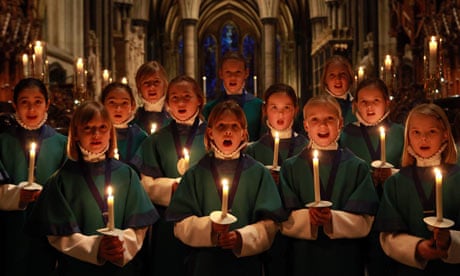Children as young as two are to be targeted as part of a new campaign to recruit young people back to the church, the Guardian has learned.
The Church of England is planning its first concerted drive to engage under- 18s after admitting that it is comprehensively failing to connect with children and teenagers.
Proposals will be put before the general synod in February that include a blueprint to set up breakfast, homework and sports clubs in schools as well as working in publicly funded toddler playgroups to spread the Christian word.
A document outlining the proposals, seen by the Guardian, says urgent action is needed to shore up the number of children in church.
"We need to reconsider how we engage with and express God's love to this generation of children and young people, whoever and wherever they may be," it says.
Using frank language, it suggests the church is failing young people by being out of touch with their lives. "The tragedy is that we appear to be failing even those with whom we have already connected. The challenge is how to creatively offer children and young people encounters with the Christian faith and the person of Jesus Christ," it says.
It comes as the archbishop of Canterbury, Rowan Williams, prepares to deliver his annual Christmas message. It is expected that he will speak of his concerns about the commercialisation of Christmas and focus again on the ravages of capitalism following a year of continuing economic turmoil.
The archbishop faces a difficult new year because of a continuing revolt over the ordination of women as bishops, with potentially hundreds of clergy converting to Roman Catholicism in protest over the issue, and the prolonged disintegration of the Anglican communion over gay and lesbian clergy. Added to this already combustible mix is a papal visit, the first from Benedict XVI. It will be their most public encounter since the papal decree allowing Anglicans to defect to Rome en masse.
The document, Going for Growth, sets out a plan devised by the Church of England's education division that promises to make churches more "child-friendly" and to work towards every child – regardless of their faith – having a "life-enhancing encounter with the Christian faith and the person of Jesus Christ". It includes:
An information campaign to supply schools with materials to fulfil their legal duty to conduct a daily act of worship amid reports that many schools have dropped it.
Creating a new "social, moral, spiritual and cultural curriculum" for further education colleges.
It identifies environmental campaigns as a key concern of children and says it must do more to act on such issues in order to win them round.
To work in youth clubs and children's playcentres to re-establish links outside of church.
The document says: "Contact centres, Sure Start projects, children's centres and extended schools provisions hold potential for the church to engage with children, young people and families through activities, breakfast and homework clubs, parenting support and sports activities."
In October Williams announced plans for a major expansion of church schools. The Church of England already sponsors 27 academies - government-funded but independently run secondaries - and has eight more in the pipeline for 2010 and another 30 under discussion.
Today's plans suggest the church intends to go beyond schools into the community in an attempt to engage people from an even earlier age. They will be debated at the general synod, the Anglican governing body, in February. If backed, the programme will be rolled out nationally.
Keith Porteous Wood, executive director of the National Secular Society, said: "For most people the church is an irrelevance and it is abusing its privilege by intruding into taxpayer-funded secular places in order to recruit the next generation of churchgoers. Parents should not be forced to have their children endure religious proselytising as a captive audience as the price of receiving public service."
The Rev Jan Ainsworth, the Church of England's chief education officer, said there was no compulsion on anyone taking part in a church-run group to become Christian and the emphasis in training would avoid the use of heavy-handed tactics. "We do not endorse high-pressure techniques, we would not endorse anything that places psychological pressure on someone. We would endorse ways of interesting children in the Christian faith and the Christian story."
She said the decline in children attending church was part of wider trends. "Sundays have changed. People go shopping or go to football. If you're in a split family will you go to church or go to see your dad? You'll go and see your dad. It's a different day than it used to be and the impact on the old-fashioned model has been quite serious." The church would target all children, not just those in Christian families, she said. The primary purpose of Going for Growth was "making sure every child does encounter the Christian faith and the Christian story".

Comments (…)
Sign in or create your Guardian account to join the discussion